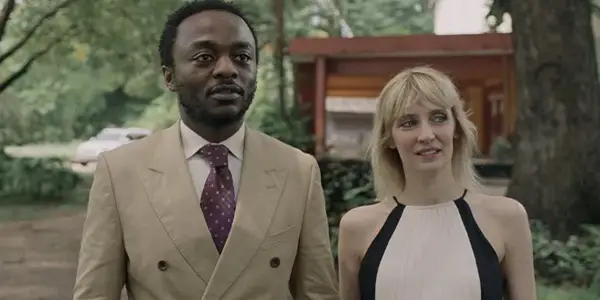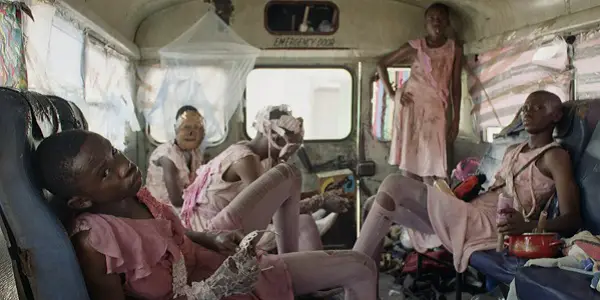Cannes Film Festival 2023: OMEN

Lee Jutton has directed short films starring a killer toaster,…
The debut feature film from Belgian-Congolese rapper and filmmaker Baloji, Omen (Augure) follows four individuals from different generations who are accused of witchcraft and sorcery for daring to defy the societal norms that seek to stifle who they truly are. The first fiction film from the Congo to screen at the Cannes Film Festival and the winner of this year’s New Voices Award, it is a fascinating portrayal of the conflict between the beliefs of one’s past and the reality of one’s present, with a surrealist aesthetic that is guaranteed to capture the imagination.
Homecoming
A Congolese expat living in Belgium, Koffi (Marc Zinga) is preparing to return to his homeland to introduce his pregnant fiancee, Alice (Lucie Debay) to his family, receive their blessings, and undergo the various rituals that he knows they will require, including the payment of a dowry. Born with a port wine stain sprawling across one cheek, Koffi has long been ostracized by his family as someone unnatural who bears what they refer to as the mark of the devil. His return only exacerbates this belief, especially after untimely nosebleed results in him being forced to undergo a kind of exorcism while a distressed Alice looks on.

But Koffi is not the only one who finds it difficult to the point of impossibility to exist in a world where spirituality, tradition, and patriarchy rule above all else — even the bond between parent and child. Koffi’s most sympathetic family member, his sister Tshala (Eliane Umuhire), is about to move to South Africa with her boyfriend, where their polyamorous relationship will be less frowned upon, while Koffi’s mother, Mujila (Yves-Marina Gnahoua), still bears emotional scars from the repression that she faced when she was younger. Meanwhile, a young gang leader named Paco (Marcel Otete Kabeya) is struggling for power with another gang of boys that mock the death of Paco’s younger sister, whose loss is depicted by Baloji in a fantastical sequence inspired by the tale of Hansel and Gretel.
Modern Mythmaking
The strongest threads of Omen’s story are those connecting Koffi and the various members of his family; Paco’s story, while told with a particularly extraordinary visual flair that mixes elements of magical realism and Afro-futurism to great effect, feels largely extraneous to the main plot, and all the more confusing because of it. Perhaps if Paco had been the subject of his own film, I would have been able to appreciate the unique complexities of his situation more.
Instead, I found myself most powerfully affected by the scenes in which Koffi attempts to navigate a world that was once his home but is now almost as foreign to him as it is to Alice, a world in which he cannot even track down his own father to convince him to meet the mother of his future grandchildren. Alice cannot understand how Koffi can put up with his family’s paranoid superstitions and the way they treat him as a dangerous sorcerer, yet Koffi finds himself defending them to her, arguing that this is their world and their way of life. Both Koffi and Tshala choose to leave their community rather than continue to push back against the culture that governs it — an extension of the incredible respect for their elders that they tell Alice was an ingrained part of their childhood, as odd as it may seem to an outsider such as her.

In the way it portrays the fear of witches that persists in modern society, Omen would make an ideal double feature with Rungano Nyoni’s phenomenal 2017 debut feature, I Am Not a Witch; in that film, a little girl is accused of witchcraft, and sent to live in one of Ghana’s witch camps, misogynistic relics that somehow persist to this day. Misogyny is also present in Omen in the treatment of Tshala and Mujila; the former is unable to fully explore her sexuality without condemnation, while the latter is still feeling the repercussions of being forced to marry someone she didn’t love without having any say in the matter. When Tshala convinces her boyfriend to see a local doctor for an STD, the immediate assumption is that they want a fertility treatment; when Mujila gifts such a treatment to Tshala upon her departure, the young woman first accepts it, then tosses it out the window of her moving car—left behind with the rest of her family’s old-fashioned notions of ideal womanhood.
Conclusion
Throughout Omen, Baloji portrays these generational struggles with imagery that draws upon folklore and the supernatural, blurring the boundaries between the past and the present, waking life, and the world of dreams. The result is an undeniably beautiful film that is a prime showcase for Baloji’s talents as a visual storyteller, even as it winds to what feels like a rushed and ultimately somewhat unsatisfying conclusion. Still, one cannot help but be moved by it.
Omen screened at the 2023 Cannes Film Festival as part of the Un Certain Regard section.
Watch Omen
Does content like this matter to you?
Become a Member and support film journalism. Unlock access to all of Film Inquiry`s great articles. Join a community of like-minded readers who are passionate about cinema - get access to our private members Network, give back to independent filmmakers, and more.
Lee Jutton has directed short films starring a killer toaster, a killer Christmas tree, and a not-killer leopard. Her writing has appeared in publications such as Film School Rejects, Bitch: A Feminist Response to Pop Culture, Bitch Flicks, TV Fanatic, and Just Press Play. When not watching, making, or writing about films, she can usually be found on Twitter obsessing over soccer, BTS, and her cat.













